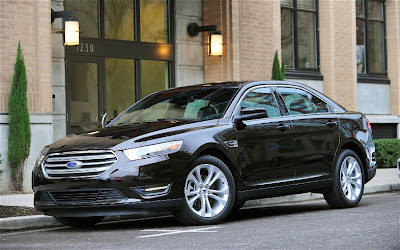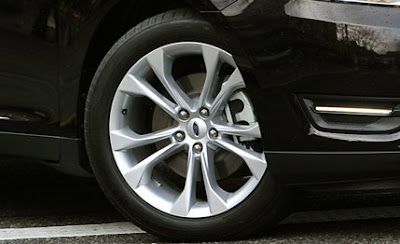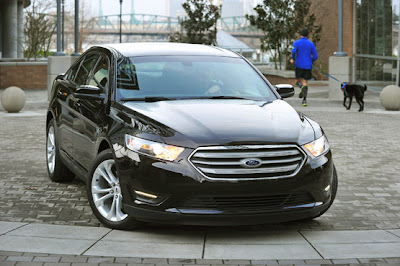Freshened for 2013, the Taurus is reminiscent of Ford’s top-line family
sedans of yesteryear, cars like the Galaxie 500, the LTD; big, comfortable, and
quiet, with relaxed dynamics and respectable power. Plus interior appointments
that border on luxury. But even though Taurus pricing can soar well above the
$40,000 threshold, Ford refrains from portraying it as a luxury sedan. As with
its premium family-sedan forebears, luxury is the province of Lincoln.
Nevertheless, there’s lots of luxury here. Check the amenities in our $35,240
all-wheel-drive SEL test car: leather seats with power adjustability and heat up
front; dual-zone auto climate control; auto-up and -down power windows; remote
starting; AM/FM/CD audio with an auxiliary jack and satellite radio;
power-adjustable pedals; ambient lighting; a rearview camera; updated MyFord
Touch secondary controls with voice-activated Sync connectivity; a
tilt/telescope steering column; adaptive cruise control; blind-spot warning with
cross-traffic alert. (In addition, Taurus models offer a new self-parking
feature, although this wasn’t part of our test car’s equipment.)
Some of the foregoing is optional equipment. But it all adds up to a car that
coddles its occupants with a rich and serene driving environment that makes
ordinary commuting and cross-country driving very pleasant indeed.
But let’s not confuse pleasant with stimulating.
Creamy Attitude
Ford characterizes the updated Taurus as “aesthetically refined,” which is
plausible, and “athletically refined,” which isn’t, unless you’re talking about
the SHO. The mainstream members of the family, including this SEL, are tuned for
creamy ride quality, which they certainly deliver. They do so at the expense of
considerable body roll, as well as a fair amount of up and down motion on bumpy
roads. All of this isolates occupants from the unpleasant realities of nasty
pavement, but makes cornering a matter of patience, transient responses
deliberate, and understeer the defining dynamic trait.
New electric-assisted power steering adds to the car’s conservative dynamics.
It’s quick, at 2.8 turns lock-to-lock, but numb and lifeless. Braking
performance, too, is no better than so-so. Equipped with optional 19-inch wheels
and low-profile Michelin Primacy MXM4 all-season tires (255/45), our test
vehicle put up a respectable skidpad number—0.84 g—but its stopping distance of
182 feet from 70 mph is lamentable in a family sedan.
Power Choices
Unlike some of its key premium-sedan competition—Hyundai Azera, Nissan
Maxima, Toyota Avalon—the Taurus offers several engines: an optional 2.0-liter
EcoBoost four, which is new to this car for 2013; a 3.5-liter EcoBoost V-6,
exclusive to the high-performance SHO; and a naturally aspirated 3.5-liter V-6,
the standard Taurus powerplant, upgraded for 2013 with variable timing on all
four overhead cams. Output for the naturally aspirated 3.5-liter six tested here
rises to 288 hp and 254 lb-ft, gains of 25 hp and 5 lb-ft of torque. The
standard V-6 also scores a 2-mpg increase in its EPA highway fuel-economy
rating, which climbs to 26 mpg (the city number remains at 18). We logged 21 mpg
in our testing.
Every Taurus is equipped with a six-speed automatic transmission that offers
a manual operating mode. All-wheel drive is a $1850 option for SEL and Limited
trim levels with the base 3.5-liter, and our test car was so equipped.
VEHICLE TYPE: front-engine, 4-wheel-drive, 5-passenger, 4-door
sedan
PRICE AS TESTED: $35,240 (base price: $31,445)
ENGINE TYPE: DOHC 24-valve V-6, aluminum block and heads, port fuel
injection
Displacement: 213 cu in, 3497 cc
Power: 288 hp @ 6500
rpm
Torque: 254 lb-ft @ 4000 rpm
TRANSMISSION: 6-speed automatic with manual shifting mode
DIMENSIONS:
Wheelbase: 112.0 in
Length:202.9
in
Width: 76.2 in Height: 60.7 in
Curb weight: 4187
lb
C/D TEST RESULTS:
Zero to 60 mph: 7.0 sec
Zero to 100 mph: 18.0
sec
Rolling start, 5–60 mph: 7.5 sec
Top gear, 30–50 mph: 3.7 sec
Top
gear, 50–70 mph: 5.1 sec
Standing ¼-mile: 15.4 sec @ 93 mph
Top speed
(governor limited): 113 mph
Braking, 70–0 mph: 182 ft
Roadholding,
300-ft-dia skidpad: 0.84 g
FUEL ECONOMY:
EPA city/highway driving: 18/26 mpg
C/D observed:
21 mpg






















0 comments:
Post a Comment